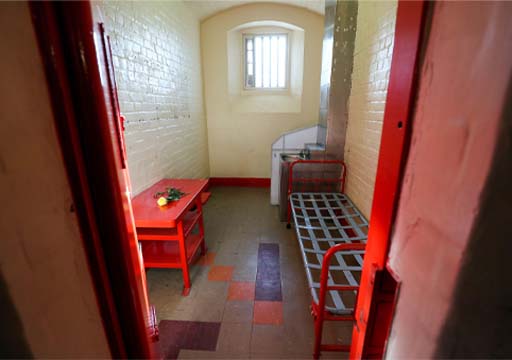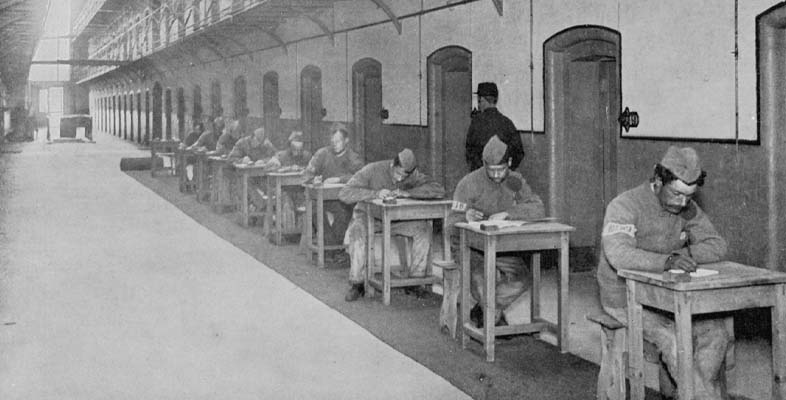2 Opposing voices
In Sessions 6 and 7 you learned that uniformity in convict and local prisons was never absolute. There were also some individuals and groups who spoke out against the harsh regime that had been created in prisons. Prison Visiting Committees – groups of local magistrates who, on losing control of local prisons as a result of nationalisation, had been compensated with visiting rights – sometimes protested about certain rules and practices.
For example, at a Visiting Committee conference in 1885, the magistrates complained bitterly about prison officials’ rigid adherence to eligibility criteria for school attendance, the exclusion of eligible women from school in some prisons because of their small numbers, and the inefficiency of cellular instruction. Lord Leigh, chairman of the Warwick Prison Visiting Committee, declared:
What we want in prison now is a good reformatory influence. There was something like a good reformatory influence before the prisons were handed over to the Government. At present there is nothing of the sort. It is all strict discipline that is carried out. Discipline is very good; but we want more than that.
From the mid-1870s, former prisoners began to publish accounts of their experiences behind bars especially in convict prisons. Most were either political prisoners (convicted of illegal forms of protest, or acts of terrorism, against the state) or white-collar prisoners (members of the professional classes typically convicted of fraudulent or domestic offences). Their memoirs exposed to the public the brutal conditions to which prisoners were subjected. However, the main thrust of their complaint was that prisoners like themselves had been subjected to the same brutal treatment as, and forced to mix with, hardened, ‘professional’ criminals (Weiner, 1990, pp. 310–13). By striving, through their writing, to separate themselves from the ‘criminal class’, they further embedded damaging stereotypes.

Activity 1 Prison memoirs
Prison memoirists of the late 1800s were already literate and numerate before their convictions. Although they complained about the quality and quantity of reading matter available to them during their imprisonment, few had much to say about the prison school because they did not attend lessons.
An exception to this was the ‘Ticket of Leave Man’, a self-proclaimed gentleman who committed a crime in a ‘state of madness’ and was sentenced to penal servitude. He anonymously published his memoir, Convict Life; or, Revelations Concerning Convicts and Convict Prisons, in 1879, basing his pen-name on the system of licensing (or parole) by which well-behaved and industrious convicts served part of their sentence in the community (as you learned in Session 6).
Read his description of the convict prison school and consider the following questions:
- ‘Ticket of Leave Man’ did not attend school in prison. How did he know what went on there?
- According to ‘Ticket of Leave Man’, what was wrong with the prison school?
- This is a very negative portrayal of the prison school. Do you think ‘Ticket of Leave Man’ was supportive of prison education?
An account of the prison school, by ‘Ticket-of-leave Man’
Now, there are thousands of prisoners unable either to read or write their own names, and whose ignorance has been one of the great obstacles to their success in life; there are hundreds of agricultural labourers, who, although they are in prison, are not vicious by nature or inclination; and there are numbers of young boys who have landed in prison in absolute ignorance, and whose presence there is due to the fact that they have been allowed to grow up without any mental or moral training. These classes have now the opportunity of attending school for one hour in a week in the winter time, and for about twenty minutes in a week in summer time!
During these minutes, the boy, the countryman, the novice in crime, sit shoulder to shoulder with old and abandoned thieves. These old thieves have not the most remote intention to learn, even if they had the opportunity, but they attend school as an excuse to get out of their cells, and because they want a change of scene and company.
When prisoners are entitled to write letters to their friends they write them in the school-hour, so that I had frequent opportunities of seeing what went on. Disgusting conversations were indulged in, the prisoners keeping their eyes upon their books to avoid detection, but under pretence of mumbling their lessons aloud they were engaged in ribald chat with their neighbours, and many were making disgusting and licentious drawings on their slates, and showing them to their pals. Classification would remedy this evil, for it is only caused by the habitual-criminal element. The other classes would profit by instruction if they had any opportunity, at present they have no chance given them.
I will describe the educational arrangements at Dartmoor. They reflect precisely the state of things at Portland, and I presume at other public-works prisons. There are five distinct prisons or halls. Once a week, in each hall, in summer for about twenty minutes and in winter for about one hour, the schoolmasters instruct, or pretend to instruct, such prisoners as can neither read nor write; no others are permitted to attend school. An utter ignorance of the history of England, or the geography of the globe, or of the simplest rules of arithmetic, are not considered sufficient reasons to warrant the interference of the schoolmaster.
The very little time allotted for educational purposes is half wasted even in this ‘once a week’ system. When the bell rings for school and the classes have assembled the roll is called, then the schoolmasters (who do everything very leisurely) distribute the copybooks or the spelling-books; then they take another slow walk round with the pens, and by the time a dozen words of one syllable have been spelt, and often before a single line in the copybook has been filled, the bell rings again. The schoolmaster’s work (?) is done, he walks – not leisurely round now, he wants to get home, or to the billiard-room in the village, and he is all in a bustle – “Now, then, hurry up with those books and pens! look sharp!” Then, away rush the “dominies” and the prisoners return to their cells about as wise as they left them. The only thing they have learned, is probably a fresh lesson in vice from their next neighbour, or the latest prison scandal and gossip.
I have certainly met with two or three men who, in spite of difficulties, have after three or four years acquired sufficient knowledge to scribble half-a-dozen ungrammatical lines to their friends; but these cases have been the result of prodigious effort, and are not the consequences of any interest which is taken in their work by the schoolmasters, who are paid very fair salaries, and whose great object seems to be to do as little as possible in return.
Discussion
- ‘Ticket of Leave Man’ observed the goings-on in the schoolroom when he was sent to evening class to write his letters under the supervision of the schoolmaster and warders. Still, he would have only attended a few times each year. Convicts who reached the first class were allowed to write a letter once every three months, while those in the third (or lowest) class could write once every six months. ‘Ticket of Leave Man’ also claimed to have met two or three men who learned to read and write in the prison school.
- ‘Ticket of Leave Man’ identified several problems with the prison school which he suggested limited any beneficial effect of the instruction provided:
- In lessons, no effort was made to separate first time offenders from habitual criminals. School provided an opportunity for the latter to ‘contaminate’ the former. (Depictions such as these helped to convince penal policymakers to establish a separate class, known as ‘star class’, for convicts of previous good character serving their first sentence.)
- The time for school was too short: only 20 minutes a week in summer, or one hour a week in winter. (Labour was carried on longer in summer than winter, hence the variable times.)
- The schoolmasters were uninterested in their work.
- Instruction was given only to those who could not read or write. Many prisoners who could have benefitted from schooling missed out.
- ‘Ticket of Leave Man’ did support the idea of prison education. He claimed that the illiteracy of thousands of prisoners prevented their success in life and he suggested that the absence of education (mental and moral training) led many to commit crime.
This was one of the very few accounts of the prison school available to the public in the late 1870s and 1880s. It may be that ‘Ticket of Leave Man’ hoped that, by exposing the problems of prison education, he might convince of the need for improvement. However, there is little evidence in this piece that the provision of education could make a positive difference to prisoners’ lives. ‘Ticket of Leave Man’ also suggested that efforts made to educate habitual criminals were a waste of time. In the past and the present, exclusively negative accounts of prisons and prisoners promote a narrative of failure which can be entirely counterproductive to positive reform.
